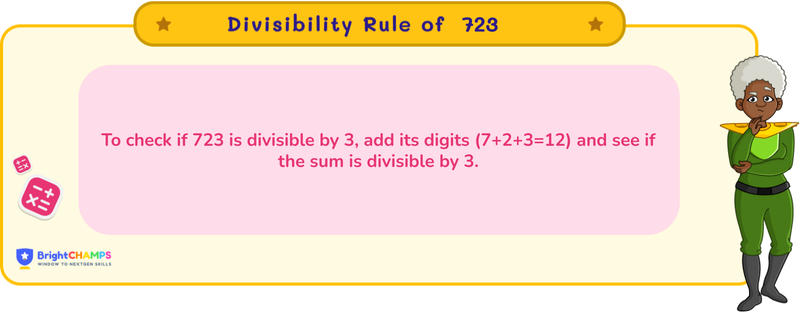
 235 Learners
235 LearnersLast updated on August 5th, 2025

Divisibility Rule of 723

The divisibility rule is a way to find out whether a number is divisible by another number without using the division method. In real life, we can use the divisibility rule for quick math, dividing things evenly, and sorting things. In this topic, we will learn about the divisibility rule of 723.
What is the Divisibility Rule of 723?
The divisibility rule for 723 is a method by which we can find out if a number is divisible by 723 without using the division method.
Check whether 1446 is divisible by 723 with the divisibility rule.
Step 1: Multiply the last digit of the number by 2. Here in 1446, 6 is the last digit, multiply it by 2. 6 × 2 = 12
Step 2: Subtract the result from Step 1 from the remaining values but do not include the last digit. i.e., 144–12 = 132.
Step 3: As it is shown that 132 is a multiple of 723, therefore, the number is divisible by 723. If the result from Step 2 isn't a multiple of 723, then the number isn't divisible by 723.
Tips and Tricks for Divisibility Rule of 723
Learning the divisibility rule will help kids master division. Let’s learn a few tips and tricks for the divisibility rule of 723.
- Know the multiples of 723: Memorize the multiples of 723 (723, 1446, 2169, etc.) to quickly check the divisibility. If the result from the subtraction is a multiple of 723, then the number is divisible by 723.
- Use the negative numbers: If the result we get after the subtraction is negative, we will avoid the symbol and consider it as positive for checking the divisibility of a number.
- Repeat the process for large numbers: Students should keep repeating the divisibility process until they reach a small number that is divisible by 723.
For example: Check if 3615 is divisible by 723 using the divisibility test. Multiply the last digit by 2, i.e., 5 × 2 = 10.
Subtract the remaining digits excluding the last digit by 10, 361–10 = 351. Still, 351 is a large number, hence we will repeat the process again. Multiply the last digit by 2, 1 × 2 = 2.
Now subtracting 2 from the remaining numbers excluding the last digit, 35–2 = 33.
As 33 is not a multiple of 723, 3615 is not divisible by 723.
- Use the division method to verify: Students can use the division method as a way to verify and cross-check their results. This will help them to verify and also learn.

Common Mistakes and How to Avoid Them in Divisibility Rule of 723
The divisibility rule of 723 helps us quickly check if the given number is divisible by 723, but common mistakes like calculation errors lead to incorrect results. Here we will understand some common mistakes that will help you to understand.

Divisibility Rule of 723 Examples

Problem 1
Is the number of pages in a book, 1446, divisible evenly among 723 readers?

Yes, 1446 is divisible by 723.
Explanation
To determine if 1446 can be evenly distributed among 723 readers, we apply the divisibility rule.
1) Divide the number, 1446, directly by 723 to check: 1446 ÷ 723 = 2.
2) Since the result is a whole number, 1446 is divisible by 723.

Problem 2
Can a conference room with a capacity of 2892 seats be filled evenly with delegates, each representing 723 attendees?

Yes, 2892 is divisible by 723.
Explanation
To check if 2892 seats can be evenly filled by delegates, we apply the divisibility rule.
1) Divide the number of seats, 2892, by 723: 2892 ÷ 723 = 4.
2) The result is a whole number, indicating that 2892 is divisible by 723.

Problem 3
A shipment of 3615 items needs to be packed in boxes, each holding 723 items. Is this possible without leftovers?

No, 3615 is not divisible by 723.
Explanation
To see if 3615 items can be packed without leftovers, we apply the divisibility rule.
1) Divide 3615 by 723: 3615 ÷ 723 ≈ 5.00276.
2) Since the result is not a whole number, 3615 is not divisible by 723.

Problem 4
A large mural composed of 579 tiles is to be divided into sections, each containing 723 tiles. Can it be evenly divided?

No, 579 is not divisible by 723.
Explanation
To determine if 579 tiles can be divided into sections of 723, we use the divisibility rule.
1) Direct division: 579 ÷ 723 ≈ 0.8.
2) The result is not a whole number, indicating 579 is not divisible by 723.

Problem 5
A concert venue can accommodate 7230 people in total. Can the venue be divided into 10 sections of equal capacity?

Yes, 7230 is divisible by 723.
Explanation
To check if the venue can be evenly divided into 10 sections, we apply the divisibility rule.
1) Divide the total capacity, 7230, by the number of sections, 10: 7230 ÷ 10 = 723.
2) The result is a whole number, so 7230 can be divided into 10 sections of equal capacity, each holding 723 people.


FAQs on Divisibility Rule of 723
1.What is the divisibility rule for 723?
2.How many numbers are there between 1 and 5000 that are divisible by 723?
3.Is 1446 divisible by 723?
4.What if I get 0 after subtracting?
5.Does the divisibility rule of 723 apply to all the integers?
6.How can children in Philippines use numbers in everyday life to understand Divisibility Rule of 723?
7.What are some fun ways kids in Philippines can practice Divisibility Rule of 723 with numbers?
8.What role do numbers and Divisibility Rule of 723 play in helping children in Philippines develop problem-solving skills?
9.How can families in Philippines create number-rich environments to improve Divisibility Rule of 723 skills?
Important Glossaries for Divisibility Rule of 723
- Divisibility rule: The set of rules used to find out whether a number is divisible by another number or not.
- Multiples: Multiples are the results we get after multiplying a number by an integer. For example, multiples of 723 are 723, 1446, 2169, etc.
- Integers: Integers are the numbers that include all the whole numbers, negative numbers, and zero.
- Subtraction: Subtraction is a process of finding out the difference between two numbers, by reducing one number from another.
- Verification: Verification is the process of confirming the validity of a calculation or result, often by using a different method such as division.
Explore More numbers
![Important Math Links Icon]() Previous to Divisibility Rule of 723
Previous to Divisibility Rule of 723
![Important Math Links Icon]() Next to Divisibility Rule of 723
Next to Divisibility Rule of 723
About BrightChamps in Philippines


Hiralee Lalitkumar Makwana
About the Author
Hiralee Lalitkumar Makwana has almost two years of teaching experience. She is a number ninja as she loves numbers. Her interest in numbers can be seen in the way she cracks math puzzles and hidden patterns.
Fun Fact
: She loves to read number jokes and games.




